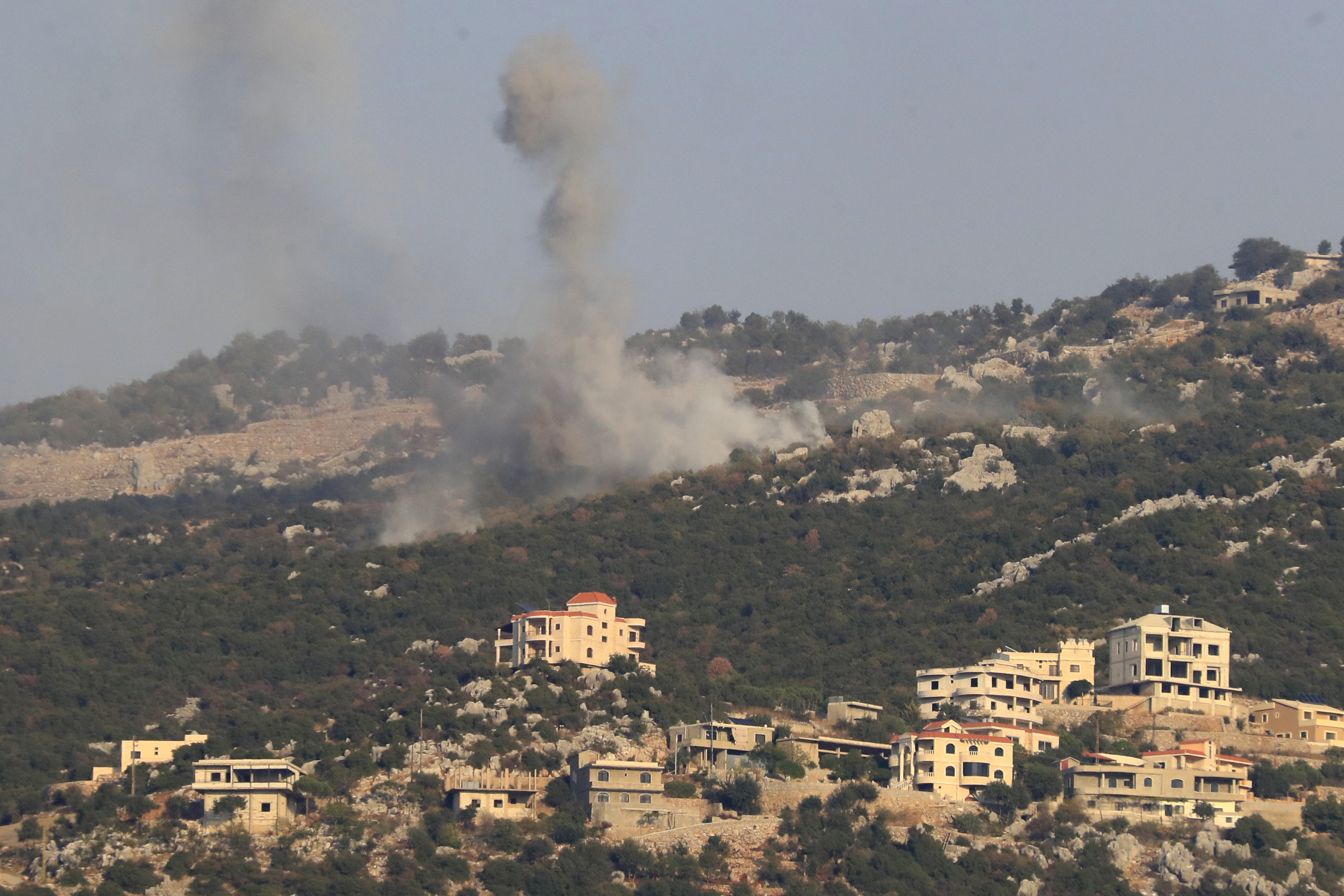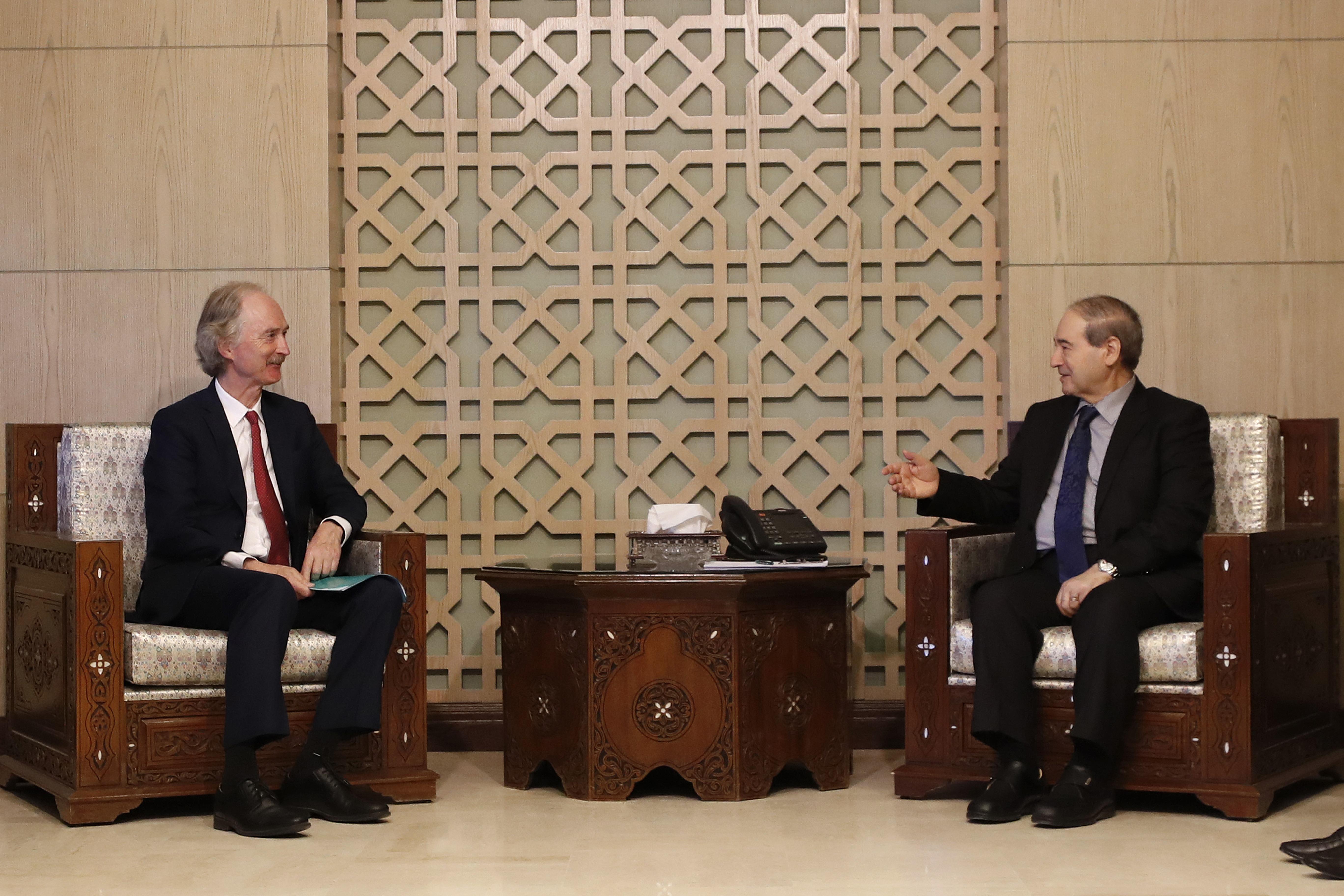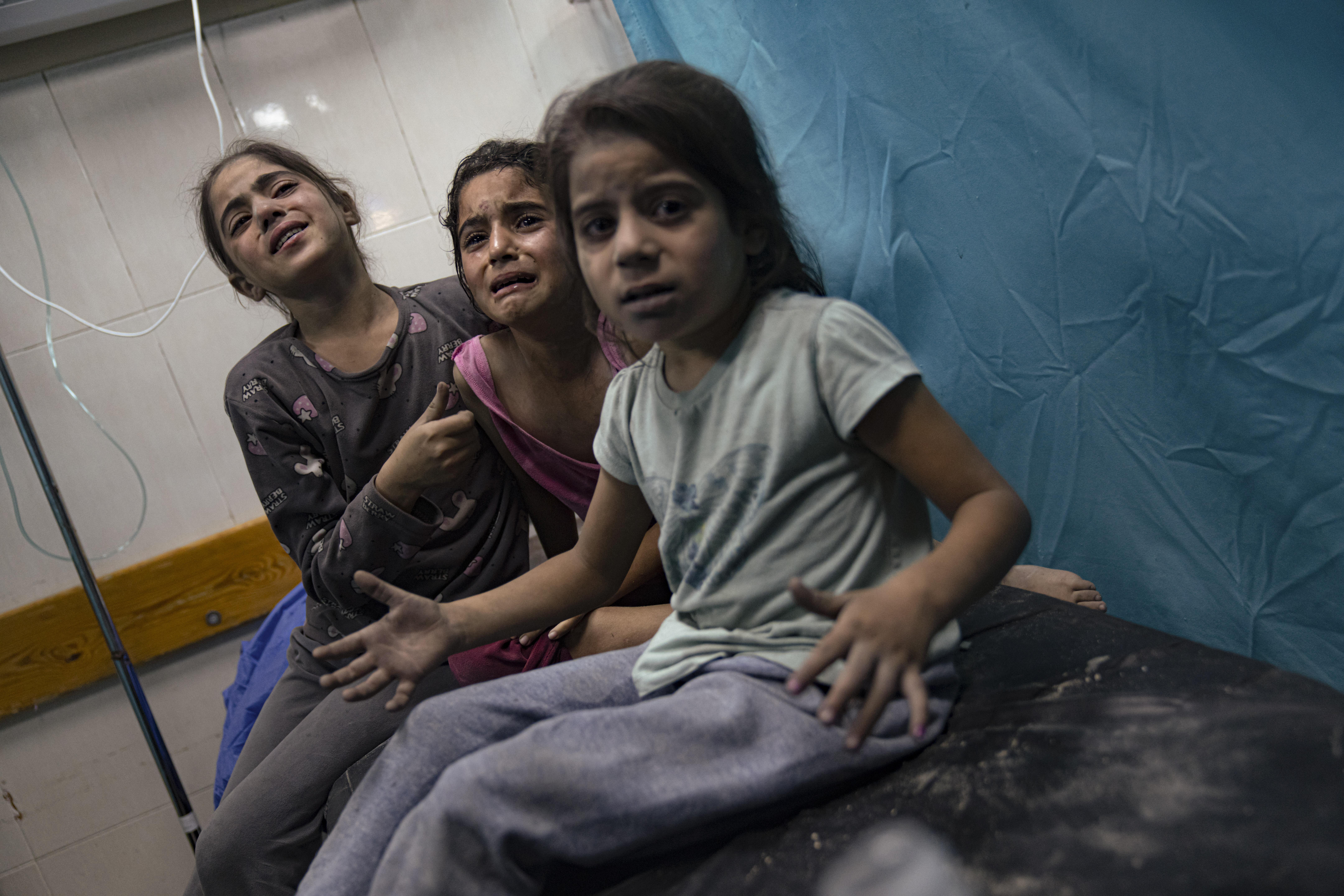 Smoke rises from Israeli shelling on the outskirts of the Lebanese village of Kfar Chouba, Lebanon, Oct 14, 2023. The shelling occurred during an exchange of fire along Lebanon's border with Syria's Israeli-occupied Golan Heights between Hezbollah fighters and Israeli troops. (PHOTO/AP)
Smoke rises from Israeli shelling on the outskirts of the Lebanese village of Kfar Chouba, Lebanon, Oct 14, 2023. The shelling occurred during an exchange of fire along Lebanon's border with Syria's Israeli-occupied Golan Heights between Hezbollah fighters and Israeli troops. (PHOTO/AP)
UNITED NATIONS/BEIRUT - UN Special Envoy for Syria Geir Pedersen on Monday warned that spillover of the Israeli-Palestinian conflict into Syria has already begun, while Lebanese Foreign Minister Abdallah Bou Habib said that "Israel's threats to attack and destroy" his country were futile and urged it to stop its war with Hamas.
Also on Monday, Commissioner-General of the UN Agency for Palestine Refugees Philippe Lazzarini said the killing of thousands of children in Gaza cannot be "collateral damage".
Spillover
Since March 2020, the Syrian conflict has been in a kind of strategic stalemate characterized by static front lines, persistent violence and sporadic escalation, with de facto authorities entrenching their control and five foreign armies present and active, he told the Security Council.
"However, I have long warned that this status quo leaves Syria at risk of drifting into deeper and prolonged fragmentation and that it involves escalation risks of the most frightening kind," he said. "My warnings have grown louder this year as we have seen growing instability and violence, exacerbated by the lack of a meaningful political process. Today, I am sounding an alarm that the situation is now at its most dangerous (point) for a long time."
Pedersen said he is sounding the alarm because, on top of the violence emanating from the Syrian conflict itself, the Syrian people now face a terrifying prospect of a potential wider escalation, given the alarming developments in Israel and the occupied Palestinian territory and the region.
"Spillover into Syria is not just a risk. It has already begun," he said.
Nearly 70 percent of those reported killed in Gaza are children and women. Save the Children, an international nongovernmental organization, reported that nearly 3,200 children have been killed in Gaza in just three weeks
Airstrikes, attributed to Israel, have hit Aleppo and Damascus airports several times in the past month. In addition, Israel says it has responded with artillery, mortar and airstrikes toward what they said were a number of launches from Syria toward Israel on the occupied Syrian Golan. The Syrian government says some of its soldiers were killed and injured in these strikes, as well as civilian workers in the strikes on the airports, said Pedersen.
ALSO READ: Israel launches retaliatory missile strike against Syria
Meanwhile, the United States says its forces have faced multiple attacks by groups that it claims are backed by Iran, including on Syrian territory. Last week, the United States carried out strikes on facilities in Syria that it claims are used by Iran's Islamic Revolutionary Guard Corps and groups it backs. Further exchanges were reported again on Monday, he noted.
"With the wider region at its most dangerous and tense (point) in a very long time, fuel is being added to a tinderbox that was already beginning to ignite. Even before the regional developments, Syria was seeing the worst surge in violence in more than three years," he said.
 UN special envoy for Syria Geir Pedersen (left) meets with Syrian Foreign Minister Faisal Mekdad, in Damascus, Syria, Sept 10, 2023. (PHOTO/AP)
UN special envoy for Syria Geir Pedersen (left) meets with Syrian Foreign Minister Faisal Mekdad, in Damascus, Syria, Sept 10, 2023. (PHOTO/AP)
There has been a significant intensification of attacks on government-controlled areas in Syria. This includes a deadly attack on the graduation ceremony of a military academy in Homs, which remains unclaimed and which the government attributed to terrorist organizations, as well as further attacks in subsequent days. It also includes reports of rocket attacks throughout October from Security Council-listed terrorist organization Hayat Tahrir al-Sham. Hundreds were reportedly injured and many dozens killed, among them civilians, he said.
Pro-government bombardment in the northwest has escalated to levels echoing those at the height of the conflict before 2020, he added.
Following a terrorist attack on Turkish government facilities in Ankara, the northeast has seen one of the largest escalations in years, with reports of Turkish strikes, the destruction of civilian infrastructure and reports of casualties, including civilians, he said.
ALSO READ: Gaza: Israel rejects calls for truce, continues ground assault
Meanwhile, the Islamic State terrorist group remains active, and has continued its attacks on forces, particularly in Deir-ez-Zor, Raqqa and the central desert region in Homs governorate, he said.
"Syria, the Syrian people and the wider region are in no position to endure new explosions of violent conflict in Syria, whether caused by internal or external dynamics. And we are seeing now the hard reality that, without real engagement and progress toward a political solution of the Syrian conflict, any stability is only wafer-thin, and when it breaks apart, it can unleash mass forces of violence and instability," warned Pedersen.
"There is a real and growing danger of this in Syria. The only antidote would be an immediate de-escalation to stem the tide of violence and refocus on a credible political process that charts a path forward in a framework that fully respects and restores Syria's sovereignty, unity, independence and territorial integrity, and that enables the Syrian people to realize their legitimate aspirations, in line with Security Council Resolution 2254," he said.
One million people, half the population of Gaza, were pushed from the north of the Gaza Strip toward the south in three weeks. The south, however, has not been spared from bombardment, with significant numbers of people killed, said Commissioner-General of the UN Agency for Palestine Refugees Philippe Lazzarini
Pedersen had four immediate messages to the Security Council:
First, the need for urgent de-escalation within Syria. Efforts are urgently needed to reinstate calm, toward a nationwide cease-fire, alongside a cooperative approach to countering Security Council-listed terrorist groups.
Second, the need for all actors -- Syrian and non-Syrian -- to exercise maximum restraint. It is particularly indefensible that Syria seems to be treated as a free-for-all space, in which different actors can settle their scores with one another, with impunity. Decisions that are outside of Syrian hands cannot be allowed to drag Syria into another war.
Third, the need for all actors to operate in full compliance with international humanitarian law, including protecting civilians and civilian infrastructure, and strictly upholding the principles of distinction and proportionality.
Fourth, the need for all key international actors to keep channels open and cooperate, despite the rising tensions on multiple fronts.
"This is the only way to de-escalate the current violence and protect the possibility of a political process to implement Security Council Resolution 2254. Complacency cannot be the answer. If it is, then I fear the already-fraying status quo may fully collapse, bringing untold misery to Syrian civilians and radiating further instability across a region that is already at breaking point. We must de-escalate -- and de-escalate now, for the sake of Syria," said Pedersen.
 Palestinian children wounded in the Israeli bombardment of the Gaza Strip seek for treatment in a hospital in Khan Younis, Oct 17, 2023. (PHOTO/AP)
Palestinian children wounded in the Israeli bombardment of the Gaza Strip seek for treatment in a hospital in Khan Younis, Oct 17, 2023. (PHOTO/AP)
Children in Gaza
Nearly 70 percent of those reported killed in Gaza are children and women. Save the Children, an international nongovernmental organization, reported that nearly 3,200 children have been killed in Gaza in just three weeks. This surpasses the number of children killed annually across the world's conflict zones since 2019, he said. "This cannot be 'collateral damage.'"
Churches, mosques, hospitals, and UNRWA facilities, including those sheltering displaced people, have not been spared. Too many people have been killed and injured while seeking safety in places protected by international humanitarian law, he told the Security Council.
The atrocities of Hamas do not absolve Israel from its obligations under international humanitarian law. Every war has rules, and this one is no exception, he said.
The current siege imposed on Gaza is collective punishment, said Lazzarini.
Clashes between Lebanon's Shi'ite military group Hezbollah and the Israeli army continued on Monday, killing a Hezbollah fighter and two members of the Palestinian Islamic Jihad group, according to statements from both groups
Two weeks of full siege followed by the trickle of aid last week mean that basic services are crumbling and that medicine, food and water, and fuel are running out. The streets of Gaza have started overflowing with sewage, which will cause a massive health hazard very soon, he said.
In the latest blow, the communications blackout over the weekend has aggravated the panic and distress of people, he said.
The blackout meant that people could not communicate with their loved ones inside Gaza to know who was dead and who was alive, that they no longer knew whether they would receive bread from UNRWA, that they felt abandoned and cut off from the rest of the world, he said.
The communications blackout has accelerated the breaking down of civil order. Panic pushed thousands of desperate people to head to the UNRWA warehouses and distribution centers. A further breakdown in civil order will make it extremely difficult, if not impossible, for UNRWA to continue operating. It will also make it impossible to bring in convoys, he warned. "I say this while being fully aware that UNRWA is the last remaining lifeline for the Palestinian people in Gaza."
The horrific attacks by Hamas in Israel on Oct 7 were shocking. The relentless bombardments by the Israeli Forces of the Gaza Strip are shocking. The level of destruction is unprecedented, the human tragedy is unbearable, said Lazzarini.
One million people, half the population of Gaza, were pushed from the north of the Gaza Strip toward the south in three weeks. The south, however, has not been spared from bombardment, with significant numbers of people killed, he said. "I have said many times, and I will say it again: no place is safe in Gaza."
What happened and continues to happen is forced displacement. Over 670,000 displaced people are now in overcrowded UNRWA schools and buildings. They live in appalling, unsanitary conditions, with limited food and water, sleeping on the floor without mattresses, or outside in the open, he said.
Lazzarini said there must be strict adherence to international humanitarian law. This means civilians and civilian infrastructure, including UN premises, schools, hospitals, places of worship, and shelters hosting civilians, must be protected all over the Gaza Strip and at all times. This is not an option, it is an obligation.
He called for a safe, unimpeded, substantial and continuous flow of humanitarian aid, including fuel, into Gaza and across the strip. For this to happen, there is a need for an immediate humanitarian cease-fire.
"An immediate humanitarian cease-fire has become a matter of life and death for millions. The present and future of Palestinians and Israelis depend on it. I urge all (UN) member states to change the trajectory of this crisis, and work toward a genuine political solution - before it's too late," said Lazzarini.
Israel urged to stop
Lebanese's Bou Habib said on Monday that "Israel's threats to attack and destroy" his country were futile in a phone conversation with his Australian counterpart Penny Wong, during which the two ministers agreed on the necessity of supporting diplomacy for a two-state solution, the state-run National News Agency reported.
Clashes between Lebanon's Shi'ite military group Hezbollah and the Israeli army continued on Monday, killing a Hezbollah fighter and two members of the Palestinian Islamic Jihad (PIJ) group, according to statements from both groups.
Hezbollah said it has lost 49 fighters since the border clashes began.
Tensions at the Lebanon-Israel border escalated when Hezbollah fired rockets at Israeli military positions on Oct 8 in support of Hamas, which had initiated a surprise attack on Israel the day before. Israel retaliated with heavy artillery fire and airstrikes, targeting multiple areas in southern Lebanon.


